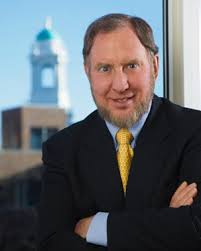Conference with Robert Putnam: Trust and Social Cohesiveness
Open conference with professor Robert D. Putnam in Copenhagen
Info about event
Time
Location
Festsalen (A220), Institut for Uddannelse og Pædagogik (DPU), Aarhus Universitet, Campus Emdrup, Tuborgvej 164, 2400 København NV

Harvard professor Robert Putnam is one of the most famous, as wells as one of the most recognised, researchers within the field of social capital in the world today. He has made vital contributions to the theory on social capital, in the form of bridge-building between various social groups, creating trust and cohesiveness. In modern-day society, with loneliness and lack of social support being increasingly large problems, and with a constantly increasing need for social capital, not least in working life, his theories remain very pertinent.
Robert Putnam will be present at the conference `Trust and Social Cohesiveness´, taking place in Copenhagen, on May 21st.
For us, as citizens, and also as professionals, ensuring that all citizens have access to sustainable and constructive social communities, in order to ensure a competitive and humane society, now and in the future, is a constantly growing challenge. Robert Putnam will be providing pertinent, evidence –based knowledge regarding the factors that need to be strengthened, in order to create such a development in the years to come.
The conference is aimed towards anyone with an interest in this area: School teachers, kindergarten teachers, educational institutions, municipalities, PPR, organisations and associations dealing with children and young people, students and others.
Programme
9.30-10.00
Coffee/tea
10.00-10.05
Official Welcome
10.05-11.15
Robert Putnam, Professor Harvard: "Bridging and trust – how to build social connectivity in complex societies".
11.15–12.00
Peter Berliner, professor, Aarhus University: "Social capital in Denmark – reflections on the application of Robert Putnam’s theory".
12.00–12.15
Questions ex auditorio to Robert Putnam and Peter Berliner
12.15–13.00
Lunch and coffee
Price and registration
- The admission fee is DKK 400.
About the speakers:
Robert Putnam is a professor at Harvard University. He is considered one of the world´s most influential researchers of Public Policy, and his international breakthrough is especially attributed to his theories on social capital and social trust, which he unfolded (among other places), in the book `Bowling Alone: The Collapse and Revival of American Community (2000)´. This epoch-making work deals with the loss of social capital, and the lack of social trust in the American society. At the moment, Putnam does research into the effects of the increasing social inequality. Furthermore, Robert Putnam has worked as an advisor for governments of many different countries during the last ten years. These years, Robert Putnam is Distinguished Visiting Professor at Aarhus University, and he points out the fact that Denmark is an interesting society to focus upon: My scientific work has been about examining the importance of `social capital´, that is to say, the ties holding a society together – and about the challenges that these ties are subjected to in modern-day society. When it comes to studying the strength of social communities, and the challenges that these communities are faced with, Denmark is the ideal laboratory´.
Peter Berliner is a professor at the Department of Education and Pedagogy, Aarhus University. He does research into social learning processes in community based projects, promoting cohesion, social networking, democracy and participation, especially in areas with social dissolution caused by disasters and/or more constant difficult conditions. During the latter years, he has also done research into how parents can be involved actively in making an effort to help marginalised children at an early stage. Thus, this effort should be considered a part of local society, and be a part of what it means to generate social capital. Most frequently, his research has been action-based, connection the development of social well-being with a deeper understanding of the underlying conditions. Thereby, the research has been closely connected to the creation of socially resilient, that is to say, democratic, peaceful local societies, based upon the Human Rights. A major part of this research has taken place, either as a part of Danida activities, International Red Cross activities, or under various UN programmes, but also includes various Danish projects, dealing with inclusion of marginalised groups in our common learning and living environments.
